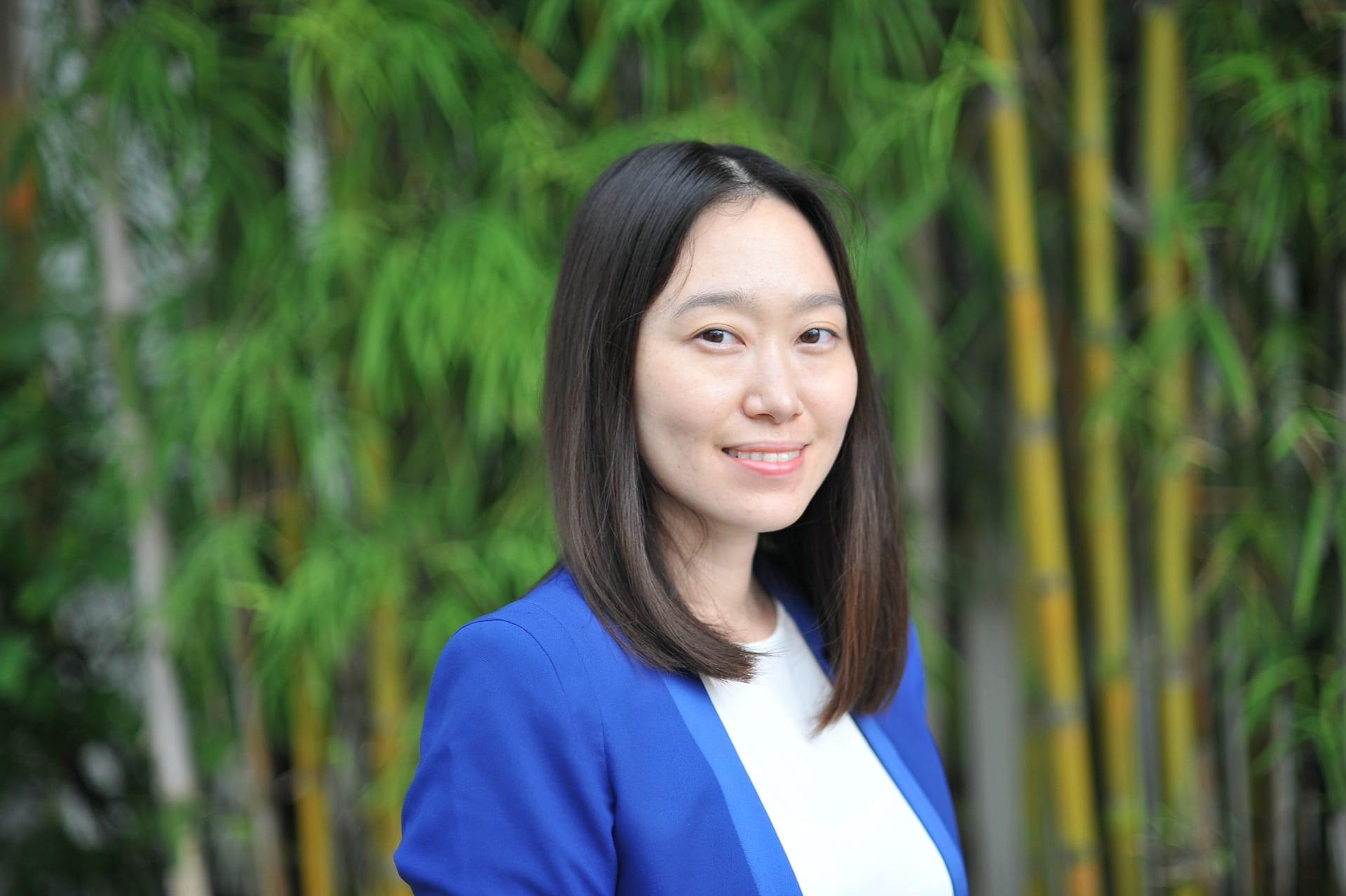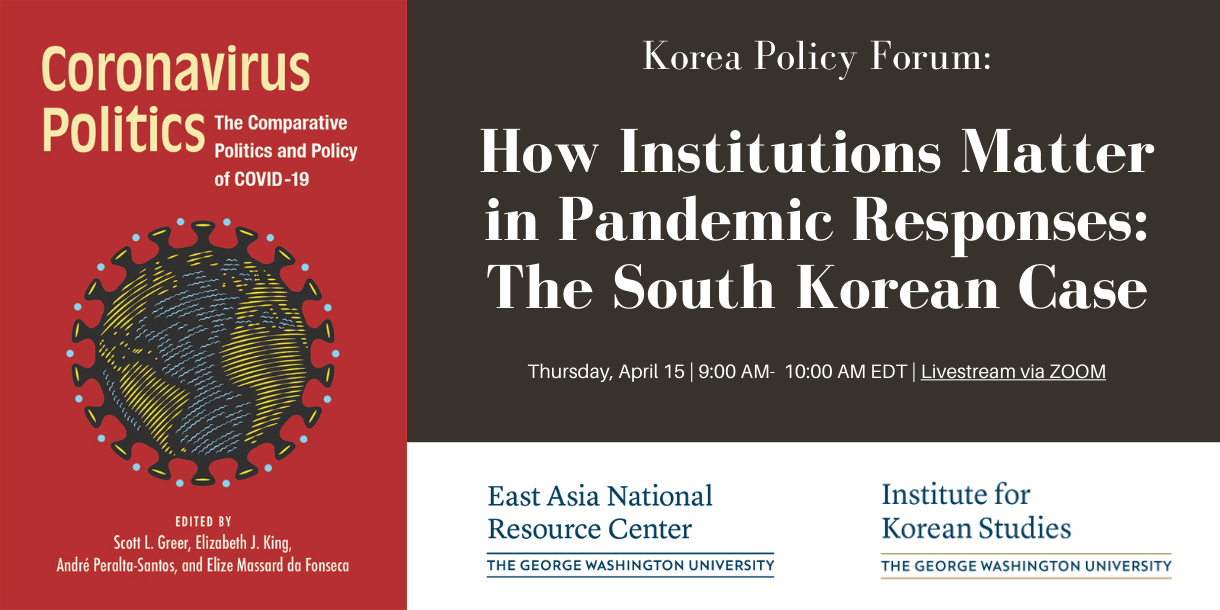Thursday, April 15th, 2021
Washington D.C. 9:00am – 10:00am ET
South Korea 10:00pm – 11:00pm KST
Livestream via ZOOM
About the Event
A forthcoming book, Coronavirus Politics (Greer et al. 2021, Michigan University Press) identifies key threads in the global comparative discussion that continue to shed light on COVID-19 and shape debates about what it means for scholarship in health and comparative politics. Contributing a chapter to the book on the South Korean pandemic governance on COVID-19 encompassing South Korea’s public health (3Ts: Testing, Tracing, Treatment) and social policies, Dr. June Park argues that functioning institutions matter in pandemic governance and determines the level of their effectiveness by scrutinizing the case of South Korea under COVID-19. She focuses on public health bureaucracy and policy coordination supported by public participation, which are vital to effective policy response. Dr. Park highlights the technocracy at the core in public health and the significant role it has come to play as the “control tower.” The book brings together over 30 authors versed in politics and the health issues in order to understand the health policy decisions, the public health interventions, the social policy decisions, their interactions, and their reasons – analyses which will serve as a record of country responses to COVID-19 and as a case reference for future pandemics.system, after fostering a strong sense of elitism in them, withdrew its ideological endorsement and material support. As a result, they turned to Decadent rebellion to reclaim their spiritual superiority yet in vain because of its internal and external paradoxes.
This event is co-sponsored by the George Washington Institute for Korean Studies and the East Asia National Resource Center at the George Washington University.
Registration
The event is open to the public. Registered guests will receive confirmation email with details for joining ZOOM 24 hours prior the event.
For more events like this and more, please follow the East Asia NRC and GWIKS on Twitter
Speaker
June Park
East Asia Voices Initiative (EAVI) Fellow, East Asia National Resource Center, George Washington University
Discussant
Celeste Arrington
Korea Foundation Associate Professor of Political Science and International Affairs, George Washington University
Moderator
Yonho Kim
Associate Research Professor of Practice and Associate Director of GW Institute for Korean Studies, George Washington University
Author

Dr. June Park is an East Asia Voices Initiative (EAVI) Fellow of the East Asia National Resource Center at the Elliot School of International Affairs at the George Washington University. She specializes in U.S. foreign economic policymaking on export-oriented countries of Northeast Asia – China, Japan and South Korea. She studies trade, energy, and tech conflicts with a broader range of regional focuses on the U.S., East Asia, Europe and the Middle East and intensive policy-oriented research on the two Koreas. She studies why countries fight and how, using what including why countries have different policy outcomes by analyzing governance structures – domestic institutions, leaderships, and bureaucracies that shape the policy formation process.
Recently, Dr. June Park was awarded the Fung Global Fellowship (Early-Career Scholar Track) at the Princeton Institute for International and Regional Studies at Princeton University for the 2021-2022 academic year her my research proposal, ‘Governing a Pandemic with Data on the Contactless Path to AI.’
Discussant

Celeste Arrington is Korea Foundation Associate Professor of Political Science and International Affairs at GW. She specializes in comparative politics, with a regional focus on the Koreas and Japan. Her research and teaching focus on law and social movements, the media, lawyers, policy processes, historical justice, North Korean human rights, and qualitative methods. She is also interested in the international relations and security of Northeast Asia and transnational activism. She is the author of Accidental Activists: Victim Movements and Governmental Accountability in Japan and South Korea (2016) and has published in Comparative Political Studies, Law & Society Review, Journal of East Asian Studies, Pacific Affairs, Asian Survey, and the Washington Post, among others. She received a Ph.D. from the University of California, Berkeley, an MPhil from the University of Cambridge, and an A.B. from Princeton University. She is currently writing a book that analyzes the role of lawyers and legal activism in Japanese and Korean policies related to persons with disabilities and tobacco control.
Moderator

Yonho Kim is Associate Research Professor of Practice and Associate Director of GW Institute for Korean Studies. He specializes in North Korea’s mobile telecommunications and U.S. policy towards North Korea. Kim is the author of North Korean Phone Money: Airtime Transfers as a Precursor to Mobile Payment System (2020), North Korea’s Mobile Telecommunications and Private Transportation Services in the Kim Jong-un Era (2019) and Cell Phones in North Korea: Has North Korea Entered the Telecommunications Revolution? (2014). His research findings were covered by various media outlets, including Wall Street Journal, The Atlantic, Yonhap News, and Libération. Prior to joining GWIKS, he extensively interacted with the Washington policy circle on the Korean peninsula as Senior Researcher of the U.S.-Korea Institute at Johns Hopkins University School of Advanced International Studies, Senior Reporter for Voice of America’s Korean Service, and Assistant Director of the Atlantic Council’s Program on Korea in Transition. He holds a B.A. and M.A. in International Relations from Seoul National University, and an M.A. in International Relations and International Economics from Johns Hopkins University School of Advanced International Studies.


